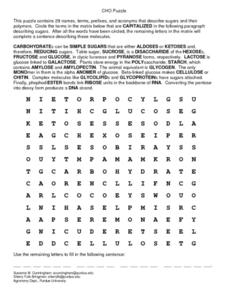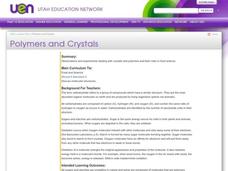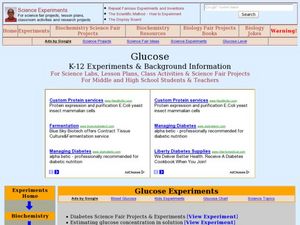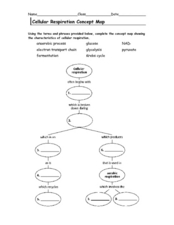TED-Ed
Sugar: Hiding in Plain Sight
Did you know that you can find added sugars in three-quarters of the foods you find in grocery stores? Invite your learners to consider how much sugar exists in the food products we eat on a day-to-day basis, as well as to learn about...
Curated OER
CHO Puzzle
In this sugar worksheet, students complete a puzzle by circling all the words in the puzzle related to sugars. The remaining letters in the puzzle create a sentence describing the sugar molecules.
Curated OER
Macromolecules
Magnify macromolecules for your biology class by having them answer these ten questions. They will define monomers and polymers, list monosaccharides, and analyze polysaccharides. In addition to assigning this to your biology class, you...
Curated OER
Polymers and Crystals: Their Role in Food Science
Blend chemistry with cooking in this exploration of polymers, carbohydrates, and food science. Experimenting with gelatin produces concrete examples of the bonding and ploymerization discussed in the lesson. Copious, comprehensive...
Curated OER
Cellular Respiration: Other Metabolites and Control of Respiration
The feedback mechanisms of metabolism of a variety of substances in the human body. Carbohydrates, lipids, amino acids, and their derivatives are explained. The biochemistry required to explain the metabolic balance and feedback controls...
Curated OER
AP: Chapter 9A: Respiration - Glycolysis
AP biologists aspire to respire with this worksheet. In it, they write short answers to 26 questions about cellular respiration. Topics addressed include the Kreb's cycle, fermentation, and more. Written as a chapter reading...
Curated OER
Catering Middle-School Science: Monomers, Polymers, and Macromolecules
Students investigate foods. In this biology lesson plan, students will conduct testing on different types of foods as they learn about different molecules that make them up. Students will also learn about the shapes of the molecules.
Curated OER
Glucose
High schoolers conduct various experiments on glucose. In this biology instructional activity, students differentiate the process of diffusion and osmosis. They test different foods for the presence of glucose and starch.
Curated OER
The Tests of Fluids for Excess Glucose, Amino Acids and Salicyclic Acid
Students test fluids for amino acids, glucose and salicyclic acid. In this chemistry indicators lesson plan, students use chromatography paper, Benedicts solution and iron chloride to test solutions for amino acids, glucose, and...
Curated OER
Photosynthesis
In this photosynthesis worksheet, students study the illustration provided and then use the 5 words listed to fill in the blanks in the sentences at the bottom of the worksheet. Students use the 5 words to label the arrows in the...
Curated OER
Nutrient Analysis Lab
In this nutrient analysis lab worksheet, students perform several experiments in a lab setting. Students test products for carbohydrates (monosaccharides and polysaccharides), proteins, lipids, and starches.
Curated OER
Studying Photosynthesis
In this photosynthesis worksheet, students conduct an experiment to show the making of starch in a plant's leaves during photosynthesis. Students complete 2 short answer questions.
Curated OER
Chemistry of Food
In this chemistry of food worksheet, students complete 20 various types of questions related to food and nutrition. First, they complete a crossword puzzle with vocabulary terms. Then, students use the figure shown to write the...
Curated OER
Photosynthesis
In this biology worksheet, students explain where the energy of food originally came from. Then the explain one of the principal chemical compounds that living things use to store energy. Students also describe how ATP and ADP differ and...
Curated OER
Cellular Respiration Concept Map
In this respiration worksheet students complete a concept map using the vocabulary words that are used in the respiration cycle.
Curated OER
Graphing Glucose Tolerance Test Results.
Students graph glucose test results to compare between people with and without diabetes. For this investigative lesson students participate in activities that allow them to better understand diabetes and how to graph results.
Curated OER
Carbon Creating Activity
In this carbon worksheet, students follow directions and use marshmallows and toothpicks to made carbon dioxide and glucose molecules. Students do this to see how carbon changes as a result of photosynthesis.
Curated OER
Milk Makes Me Sick
Students experiment with lactase to find out how milk sugar is broken down in the body. In this enzyme lesson plan, students use glucose strips to investigate the breakdown of lactose into glucose and galactose for milk digestion in the...
Curated OER
Atoms-How Sweet They Are!
In this atoms and sugar molecules learning exercise, students are given the structural composition of the sugar molecule maltose. They determine the number of each type of atom in the molecule, they find the ratio of hydrogen to oxygen...
Curated OER
Murder and a Meal
In this murder and a meal worksheet, students read the given scenario and determine a procedure to test each organic macromolecule stated in the reading. Students write out the procedure for testing. Students complete a chart that...
Curated OER
Photosynthesis and Cellular Respiration
In this energy worksheet, students review the processes that create energy for a cell: photosynthesis and cellular respiration. This worksheet has 11 fill in the blank and 14 short answer questions.
Curated OER
Biologically Important Molecules
In this biologically important molecules learning exercise, students fill in the blank with information about carbohydrates, lipids, and proteins. Students also make notes about nucleic acids.
Curated OER
Carbohydrate Chemistry
For this chemistry worksheet, students identify and define various types of carbohydrates. Then they draw a Haworth projection representing monosaccharaides. Students also draw a Fischer projection to illustrate the structure of glucose.
Curated OER
Science: Pigments and Photosynthesis
Young scholars explore the process of photosynthesis by identifying chloroplasts and chlorophyll pigments. In a demonstration, they observe a demonstration connecting pigments with sunlight conversion into energy. Using paper...

























